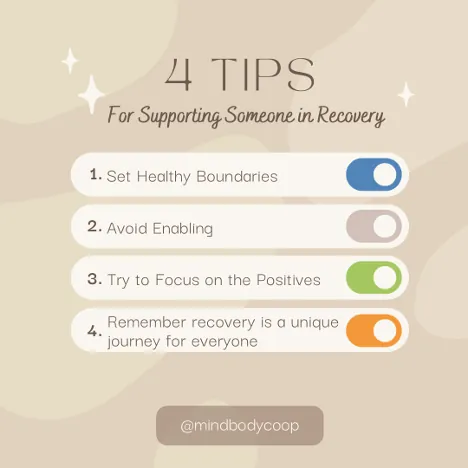Compassionate Guidance for Families and Loved Ones

As of 2024, in the United States, approximately 58.3% of individuals aged 12 and older reported using tobacco products, vaping nicotine, drinking alcohol, or using an illicit drug in the past month, and roughly 48 million people reported having struggled with a substance use disorder in the past year. These numbers continue to rise, leaving more families and communities feeling the deep and lasting effects of addiction — whether directly or through a loved one’s experience. Watching someone we love struggle with addiction can leave us feeling powerless. Fortunately, there are ways to support your loved one and care for yourself through the ups and downs of recovery.
Understanding Addiction and Supporting Someone in Recovery
Although you may never fully understand what an individual in recovery is going through, you can still learn more about addiction. Addiction is a chronic brain disease that rewires the brain and interferes with the reward system. As a result, it can lead to compulsive substance-seeking behaviors and cravings. In addition, addiction affects decision-making skills and emotional regulation. Understanding the nature of this disease can help you build empathy and compassion for what your loved one is experiencing.
Avoid Enabling and Set Healthy Boundaries to Support Recovery
It is important not to engage in behaviors that may enable your loved one. Although enabling often comes from a genuine desire to help, it is not beneficial in the long run. Ignoring problematic behaviors, making excuses, or taking over responsibilities can all be forms of enabling. Therefore, allowing your loved one to face natural consequences can be necessary for change. Enabling behaviors can unintentionally “keep an addiction in place.” Ultimately, setting healthy boundaries is essential. Open and honest communication also helps promote clarity and healthier relationships.
Recovery Is a Unique Journey for Each Individual
There is no single “right” way to approach recovery. Every person’s journey is different. What works for one person may not work for another. Setbacks can happen. However, a relapse does not mean failure — it may simply mean a new approach is needed. Research shows that recovery is about much more than just staying sober — it’s a personal process shaped by each person’s life, environment, and experiences. Meanwhile, many treatment modalities, support groups, and medications are available. Remember, your support matters, and your loved one is not alone.
Focus on the Positives During Recovery
It’s easy to dwell on what’s going wrong. Instead, notice what is going right. Celebrate small victories, because even small steps show growth. Recovery can be hard, and people often face guilt or shame early on. For example, noticing positive emotional and behavioral changes helps build confidence and hope. Research shows that focusing on strengths, hopes, and goals builds motivation and resilience. Ultimately, focus on the present and what can make tomorrow brighter.
Self-Care for Families Supporting Recovery
Last, but definitely not least, take care of yourself both physically and mentally. Addiction is often called a family disease, as its impact extends far beyond the individual using substances. Loved ones can feel confusion, guilt, fear, and exhaustion. These emotions are normal and valid. Because addiction can be overwhelming, self-care helps you manage stress and stay grounded. Engaging in self-care activities, such as exercise, journaling, connecting with others, or resting, can help build resilience. Ultimately, self-care takes different forms for everyone, so try various approaches until you find what works best for you.
Support Groups and Resources for Loved Ones in Recovery
During recovery, both individuals and their families benefit from community support. It may help to know that groups exist for family members of those battling addiction. These include Al-Anon and Nar-Anon, where you can connect with others who understand. SAMHSA also offers a helpline to help you find treatment centers, therapists, and other resources. As a result, you can feel less alone and more supported. Recovery is a lifelong process. Therefore, be patient, stay hopeful, and remember that you and your loved one are not alone.
Get in Touch
If you have a loved one struggling with substance use or addiction, we can help. Reach out to info@mindbodycoopchicago.com to learn more about our substance use and addiction treatment options.

